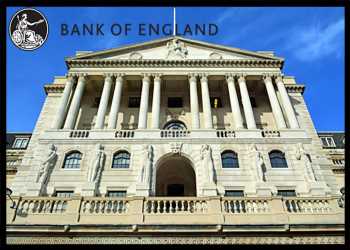Bank Of England Delivers Biggest Rate Hike In 33 Years

The Bank of England delivered the biggest interest rate hike in 33 years on Thursday, joining its global peers in aggressive tightening to bring inflation down from double-digits, even as the U.K. economy is forecast to remain in a prolonged recession.
The nine-member Monetary Policy Committee decided to raise the bank rate by 75 basis points to 3.00 percent from 2.25 percent.
The 75 basis point hike was the largest since 1989. The current tightening cycle that began last December has taken the bank rate to the highest since November 2008.
The UK central bank announcement came after the U.S. Federal Reserve lifted its benchmark rate by 75 bps for the fourth straight meeting, on Wednesday. That said, the Fed signaled more moderate moves ahead.
In Europe, the European Central Bank had hiked the rate by a similar 75 bps over the last two consecutive meetings.
The MPC voted 7-2 to lift the rate by 75 basis points, the BoE said. Policymaker Swati Dhingra preferred to hike the interest rate by 0.5 percentage points, while rate-setter Silvana Tenreyro sought a 25 basis point raise.
Seven policymakers assessed that a more forceful response was justified, given the tight labor market conditions and elevated cost and price pressures.
“A larger increase in Bank Rate at this meeting would help to bring inflation back to the 2 percent target sustainably in the medium term, and to reduce the risks of a more extended and costly tightening late,” the majority of members said.
The Bank of England Governor Andrew Bailey said interest rates are unlikely to rise as much as financial markets currently expect.
The latest 75 basis point hike is likely to be a one-off, ING economist James Smith said. The economist expects the BoE to raise the rate by 50 basis points in December, but said the rate is unlikely to rise above 4 percent next year.
The Monetary Policy Report provided a very challenging outlook for the UK economy as the MPC sees recession for a prolonged period.
The BoE expects the economy to shrink 0.5 percent in the third quarter and by 0.3 percent in the fourth quarter of this year. The economy is projected to remain in recession throughout next year and the first half of 2024, and to recover only gradually thereafter.
The unemployment rate is forecast to rise to just under 6.5 percent by the end of the forecast period and the aggregate slack increases to 3 percent of potential GDP.
In September, inflation was 10.1 percent, the highest since the series began in January 1997.
Inflation is expected to peak at around 11 percent in the fourth quarter of this year. The near-term forecast was lower than what was expected in the August Report due to the impact of the Energy Price Guarantee.
Despite a fall in global price pressures as well as a marked drop in the contribution of household energy prices to inflation, domestic inflationary pressures are set to remain strong over the next year, the bank noted.
Nonetheless, the rising degree of economic slack suppresses the domestic price pressures, the BoE said.
Inflation is projected to fall sharply to around 5 percent by the end of next year and to fall to 1.4 percent in two years’ time and to zero percent in three years’ time, with a negative contribution from energy prices and weakening domestic pressures.
Source: Read Full Article
